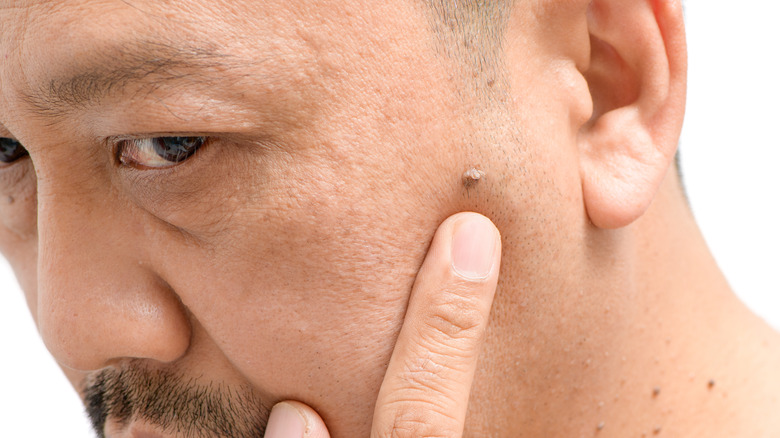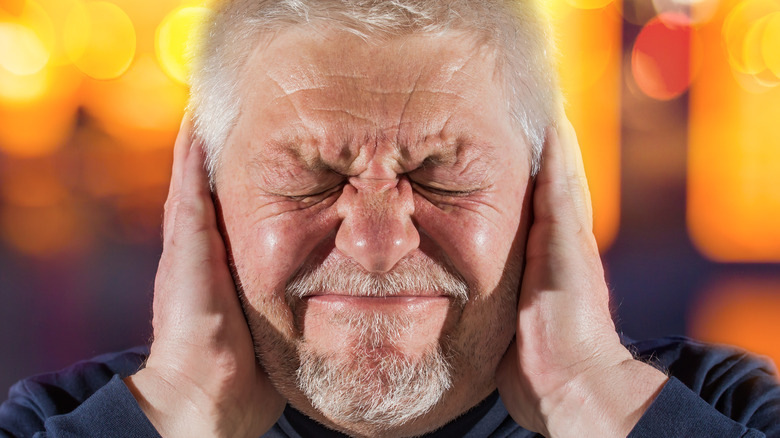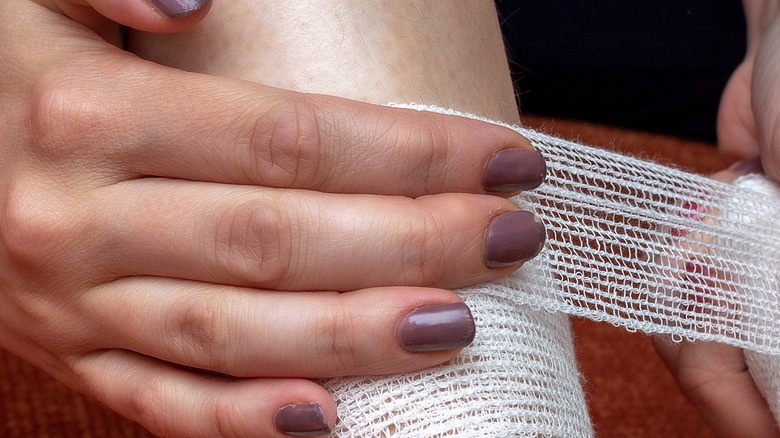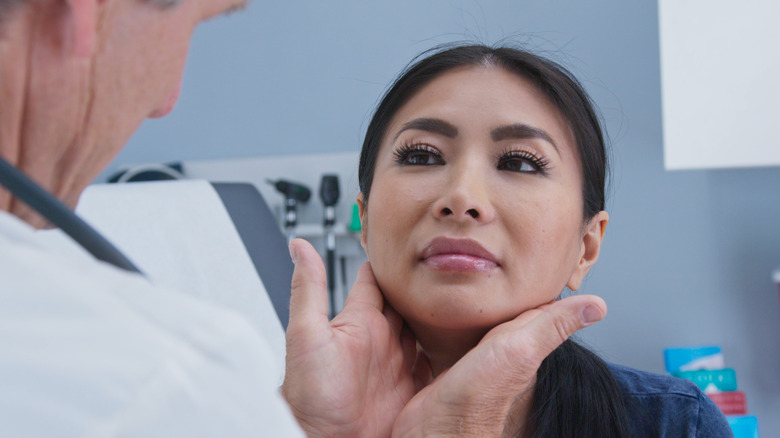Scary Symptoms That Aren't As Serious As You Think
Unexpected symptoms can be pretty scary, leading your mind to assume the worst. Our imaginations have incredible power to scare us into believing something sinister is agoot when we detect anything unusual about our bodies, a thought pattern that often stems in part from our fear of the unknown (via Healthline).
You might panic if you notice a strange skin lesion, sense an increased heart rate, or experience occasional forgetfulness. The truth is that most scary symptoms are not as serious as you think. Sure, some symptoms may indicate a significant problem, but the majority are no cause for concern.
If you believe going directly to your doctor or relying on the advice of friends or questionable internet sources is the best option, having the truth on your side for once can be incredibly comforting. The following common symptoms may appear alarming but aren't as scary as they seem; here's what to do if you notice them and when to seek medical attention.
Elevated heart rate and other anxiety symptoms
Anxiety can cause physiological reactions in your body that mimic other health conditions. This can be scary, especially if you've never experienced an accelerated heart rate that makes it seem like your heart is racing out of your chest, fluttering, or pounding too hard. These symptoms may cause heightened worry, tension, increased blood pressure, and even stomach pains or churning — and they're sometimes reminiscent of the symptoms of a heart attack (via Medical News Today). The good news is that these symptoms don't always indicate a serious problem, even though it can feel like something is very wrong.
According to the American Psychological Association, anxiety is an emotion that most people experience from time to time. So, how do you manage these emotions while also taking control of your anxiety-related bodily responses? The Anxiety & Depression Association of America (ADAA) recommends altering the thought patterns that suggest the experience of anxiety should elicit a fight or flight response. Remind yourself that you do not need to leave or avoid situations that trigger anxiety because there is no material threat. Training your mind to realize those physiological feelings are unpleasant but will not harm you can help you push through your fear. Nonetheless, you should see your doctor if your symptoms worsen over time or interfere with your daily activities.
If you or someone you know is struggling with mental health, please contact the Crisis Text Line by texting HOME to 741741, call the National Alliance on Mental Illness helpline at 1-800-950-NAMI (6264), or visit the National Institute of Mental Health website.
Are skin tags an annoyance or a cause for concern?
The largest and most apparent organ in your body is your skin. You may readily detect changes that cause alarm simply because they are so evident. Some people get scared when they develop skin tags because they're afraid of developing cancer; if you see something out of the ordinary happening with your skin, that can be the first place the mind goes.
Not all changes or growths on the skin are cancerous. A skin tag is a common type of skin lesion. The Mayo Clinic describes skin tags as flesh-colored tissue linked to a tiny stalk or piece of skin that frequently forms in the body's creases where friction is common. Skin tags can be annoying and even concerning if you don't know what they mean, but in reality, there is no need to worry. These skin growths are pretty harmless. If your skin tag is in a location that rubs, causes pain, or bleeding, do not try to remove it at home as it could lead to an infection. See a dermatologist to have it removed safely.
Tinnitus: What is going on in my head?
Ringing, buzzing, or the sense of hearing noise when there is no external source may scare you into thinking you're losing your hearing or, worse, that you have a brain tumor or a neurological illness. However, ringing in the ears, commonly known as tinnitus, actually affects over 10% of the adult population, according to the National Institute on Deafness and Other Communication Disorders.
Tinnitus is usually a harmless symptom that goes away on its own, though for some, the noise can be debilitating and interfere with daily life (per Cleveland Clinic). Some causes, such as fluid in the ears or wax buildup, are pretty simple to identify. Others explanations, on the other hand, are a little harder to come by. Excessive loudness and persistent exposure to loud noises, according to Dr. Andrew Resnick, an audiologist at Resnick Audiology in New York, can lead patients to experience ringing in the ears at a more significant level, creating an increase in stress and a lower quality of life.
Suppose the noise persists and does not go away. In that case, you should see your doctor to rule out other health problems, such as vertigo, head injuries, and dental problems, or to review medications and possible neurological causes (per Cleveland Clinic).
Forgetfulness
You've used your ATM card a thousand times, but when it came time to enter your PIN, your mind went blank; sound familiar? We've all been in situations where we've forgotten why we're in a particular location or where we placed our glasses or house keys. According to the National Institute on Aging, memory loss or forgetfulness becomes more common as individuals become older. It can be a scary experience that makes you fear the worse, such as the possibility of early dementia or Alzheimer's disease.
According to WebMD, one in nine adults in America over 45 years old report memory lapses. However, because forgetfulness happens to almost everyone at some point in their lives, it is rarely a cause for alarm. These periods of forgetfulness can be frustrating and unpleasant, but you can rest easy until you or your loved ones notice that these episodes are becoming more consistent. Several things can help improve your memory, such as maintaining a social lifestyle and participating in stimulating activities that challenge your mind, such as puzzles, games, or reading (via OSF Healthcare).
If memory loss disrupts your life or you are concerned about worsening symptoms, it may be time to see your doctor.
Why are my hands shaky?
Shaky hands might be a minor annoyance or make it challenging to carry out regular activities. Some people mistake hand tremors or shakiness for symptoms of Parkinson's disease or other tremor disorders, causing an increase in anxiety and exacerbating the situation.
Many things might induce shaky hands, including too much caffeine, anxiety, or a lack of sleep, in addition to low blood pressure, alcohol, or specific side effects of medications (via Medical News Today). Although this may be a scary symptom, most cases are preventable or treatable with a few conscientious lifestyle changes.
So when should you seek medical advice? According to Gathline Etienne, M.D., a neurologist, if you experience shaky hands frequently or the shakiness interferes with typical tasks like getting dressed, eating or drinking, and other daily activities, it may be time to seek medical advice to determine the cause and treatment options.
When is a bleeding cut serious?
Let's face, it accidents happen. Your body is resilient and capable of enduring a great deal. But because some areas of your body, such as your head, bleed more than other areas when cut, minor wounds can be scary due to the volume of blood they produce. Most superficial wounds can be treated at home (via HealthLink BC). Nevertheless, you should know what to do when you have a cut and how to recognize when you need medical attention.
If you injure yourself and the wound is bleeding, wash the wound, then apply direct pressure and, if possible, elevate the wound to stop the bleeding. If the bleeding slows down or stops with pressure but continues after you release, continue applying pressure for at least 15 minutes (via Healthline). You may soak through a few bandages, but if the blood is not pumping or gushing out quickly, you can continue to evaluate. Once the bleeding stops, apply a fresh bandage. However, if the bleeding is still soaking through the bandage and not slowing down with pressure after 15 minutes, or if the injury is located in an area such as the chest or abdomen, you should seek medical attention (via Cleveland Clinic).
Involuntary eye twitching
When your eyesight is affected by eye twitching, it can be an irritating or even disturbing experience. You might be wondering if it's something to be concerned about. The most frequent causes of eye twitching are stress and exhaustion, which should be no surprise (via Cleveland Clinic). We live in a digital age where it is typical to spend more time than necessary staring at phone screens, computers, and televisions. Excessive use of these devices can cause the eyes to strain and eventually start twitching (via Gerstein Eye Institute).
Because overuse or stress are the leading causes of eye twitching, you should try to figure out what may be causing your stress and rest your eyes when you feel the dreaded twitch start. It could be your body's not-so-subtle hint that you need to take a break — and most eye twitches resolve without medical intervention. However, if twitching persists for more than a few weeks and additional symptoms accompany it, it's time to seek medical help, as the Cleveland Clinic advises. In very rare circumstances, eye twitching can be caused by nervous system disorders (via Mayo Clinic).
Unexplained bruises
Another nasty bruise has surfaced. You haven't bumped anything, but you've noticed more and more bruises recently. There's no reason to be scared. Although it is uncommon for bruises to indicate an underlying medical condition, it can be concerning if you continue to see bruises and have no idea how they developed.
Bruises are caused by physical trauma to the tissues, which can occur when we collide with something, fall, or unintentionally bump our limbs. A bruise develops when capillaries are damaged beneath the skin during the trauma (via U.S. News & World Report).
Certain drugs, such as aspirin, anti-inflammatory medications, and blood thinners, might cause quick or easy bruising. Some of these medications are used regularly to treat aches and pains, while others treat specific health problems. Before discontinuing any prescribed drugs, consult your physician (per American Family Physician). Unfortunately, as we age, our skin thins and becomes more brittle, making older adults more prone to bruising.
According to Medicine Net, if you notice a bruise growing in size, causing extreme discomfort, or appearing over a joint — or if, along with your bruising, you develop a fever or external bleeding from orifices such as your mouth or nose — you should see a doctor.
Are headaches just uncomfortable or should I be worried?
Headaches often are extremely painful. When combined with nausea and vomiting or pain radiating to the neck, eyes, cheeks, and shoulders, they can make you think something's seriously wrong. As a result, you might be scared that the discomfort indicates the presence of a brain aneurysm or other alarming condition. According to NPR, some physicians recall seeing more people with benign headaches in 2021 due to worry that their headaches were linked to COVID-19; when a headache does strike, it seems the first instinct is often to tie it to something serious.
Before jumping to the worst-case scenario, though, it's crucial to understand that headaches are one of the most common disorders. Almost half of all adults suffer from headaches at least once a year (via World Health Organization). Many headaches are minor annoyances, and nothing to be concerned about.
So, how can you know if you should be worried? There are many different sorts of headaches that people experience, and as previously stated, the majority of them are common and treatable. If headaches interfere with your daily activities, create additional symptoms, increase in pain without relief, or do not go away after a few days, you should consult your doctor. Additionally, you should be wary of a headache that comes on suddenly and peaks in pain within a matter of seconds. As NPR explains, this thunderclap headache can be a sign of a serious emergency.
Cracking and popping joints
A lot of things can trigger joint cracking. Hearing a joint pop when getting out of a chair or with regular movements might be scary. This noise is frequently loud, but it is common and is not usually a sign of a bone problem. And though these sudden noises may become more frequent as we get older, you shouldn't be alarmed if there is no apparent swelling or pain (via Healthline).
Orthopedic surgeon Kim Stearns explains to the Cleveland Clinic that cartilage often wears down as we age, and as a result, the surfaces of our joints can generate more noise with movement. According to Robert Klapper, orthopedic surgeon at Cedar Sinai, the noise we hear when popping a joint can also be explained by nitrogen bubbles bursting in the synovial fluid. This can be done on purpose, by popping the knuckles for example, or happen unintentionally while simply moving around.
If cracking is followed by pain or inflammation, however, an underlying problem may have to be addressed. Consult your doctor for further information (via WebMD).
Chest pain
Because most people link chest pain with a heart attack, you may be scared if you experience an abnormal feeling in your chest. However, other health-related issues can cause chest pain or discomfort. For example, the lungs, digestive organs, muscles, rib cage, bones, and the heart are all found in or near the chest cavity, and various conditions in these areas can all cause pain in the chest (via Wexner Medical Center).
In the United States, 25% of adults suffer from non-cardiac chest pain. In the emergency room, up to 75% of individuals who complain of chest pain are sent home with a diagnosis other than cardiac issues (via Cleveland Clinic). Of course, it's still essential to be aware of your heart disease risks as well as the most prevalent signs of a heart attack (via CDC), but it can be comforting to know that most chest pain will have a more benign explanation.
The majority of serious forms of chest pain strike quickly and do not go away independently. As chest pain is a symptom that can be related to life-threatening diseases, Wexner Medical Center advises that it's never a bad idea to seek medical help if you're concerned.
Swollen lymph nodes
Have you ever touched your neck while you had a sore throat or a cold and felt a small bean-shaped lump that scared you into researching your symptoms? There's no need to push the panic button; you were probably feeling a swollen lymph node (via Cleveland Clinic). When a lymph node is swollen, it most often indicates your body is fighting an infection. This swelling is common, especially among children with viral infections (per the American Academy of Pediatrics). Very rarely, swollen lymph nodes are associated with cancer (via HealthONE Family Medicine).
According to the Cleveland Clinic, the human body contains hundreds of lymph nodes. The lymphatic system's primary role is to protect your body from infections and illness, but it also serves various other purposes. Often, a swollen lymph node is simply a sign that your body is protecting you as it is designed to. However, you should consult your doctor if you detect swollen lymph nodes accompanied by extreme fatigue that lingers longer than a few weeks.













